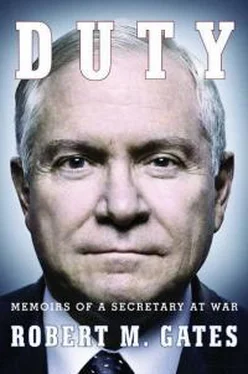In the Bush administration, the fights with Congress were mostly over Iraq troop levels, timetables and deadlines, and war budgets. As I turned my focus to budget and program matters under President Obama, I was more or less continuously outraged by the parochial self-interest of all but a very few members of Congress. Any defense facility or contract in their district or state, no matter how superfluous or wasteful, was sacrosanct.
I suppose I should have known better going in, but I was constantly amazed and infuriated at the hypocrisy of those who most stridently attacked the Defense Department for being inefficient and wasteful but would fight tooth and nail to prevent any reduction in defense activities in their home state or district no matter how inefficient or wasteful. However, behavior that was simply frustrating to me in 2009–10 will seriously impair our national security in the years ahead as the defense budget shrinks: failure to cut or close unneeded programs and facilities will drain precious dollars from the troops and our war-fighting capabilities.
A second source of frustration, as you might suspect, was the failure of Congress to do its most basic job: appropriate money. I prepared five budgets for Congress from 2007 to 2011, and not once was a defense appropriations bill enacted before the start of the new fiscal year. The impact of this, and the associated “continuing resolutions”—which kept the funding level at the previous year’s appropriations and did not allow for starting any new program—was dramatically disruptive of sensible and efficient management of the department. This was an outrageous dereliction of duty.
I was exceptionally offended by the constant adversarial, inquisitionlike treatment of executive branch officials by too many members of Congress across the political spectrum—a kangaroo-court environment in hearings, especially when the press and television cameras were present. Sharp questioning of witnesses should be expected and is entirely appropriate. But rude, insulting, belittling, bullying, and all too often highly personal attacks by members of Congress violated nearly every norm of civil behavior as they postured and acted as judge, jury, and executioner. It was as though most members were in a permanent state of outrage or suffered from some sort of mental duress that warranted confinement or at least treatment for anger management. I had to put up with less of this Queeg-like behavior than almost anyone, but I was infuriated by the harsh treatment of my subordinates, both civilian and military. The temptation to stand up, slam the briefing book shut, and quit on the spot recurred often. All too frequently, sitting at that witness table, the exit lines were on the tip of my tongue: I may be the secretary of defense, but I am also an American citizen, and there is no son of a bitch in the world who can talk to me like that. I quit. Find somebody else . It was, I am confident, a widely shared fantasy throughout the executive branch. And it was always enjoyable to listen to three former senators—Obama, Biden, and Clinton—trash-talking Congress.
Uncivil, incompetent in fulfilling basic constitutional responsibilities (such as timely appropriations), micromanagerial, parochial, hypocritical, egotistical, thin-skinned, often putting self (and reelection) before country—this was my view of the majority of the United States Congress.
It required an extraordinary effort on the part of Robert Rangel to keep me from erupting in a hearing but also to do the necessary courtesy calls, outreach, and day-to-day schmoozing with members. Robert had been a staff member of the House Armed Services Committee for years, including serving as its staff director, and so he had a longer and different perspective than I did—fortunately. He was better able to set aside (or ignore) members’ behavior—he was used to it—and kept focused on our fundamental dependence on members’ goodwill and legislative actions. With his wise and restraining hand, the clenched teeth behind my smile when on the Hill remained well hidden. It was just another battlefield in my wars.
What Rangel knew, and persuaded me to heed, was that a secretary of defense faces a steep uphill battle to be successful if he or she does not have a strong, nonpartisan relationship with Congress and respect among the members. From slow-rolling (or opposing) confirmation of Defense nominees, to conducting intrusive and time-consuming investigations, imposing legislative restrictions, opposing budget proposals, holding protracted hearings, and much more, Congress can truly make a secretary’s life miserable. And so for four and a half years, I dutifully marched to the Hill to meet with the leadership, the party caucuses, committee leaders, and individual members. I behaved myself in hearings, letting my respectful demeanor implicitly draw the contrast with the boorishness of the members. Future secretaries would do well to remember Rangel’s guidance, despite the outrageousness of their situation.
While American politics has always been a shrill, partisan, and ugly business going back to the Founding Fathers, we have rarely been so polarized and so unable to execute even the basic functions of government, much less tackle the most difficult and divisive problems facing the country. I believe that is due to the incessant scorched-earth battling between Congress and the president (I saw it under both Bush and Obama) but even more so to the weakening of the moderate center of both parties in Congress. Progress in America historically has come from thinkers and ideologues on both the left and the right, but the best of those ideas have been enacted into law through compromise. Now moderation is equated with lacking principles, and compromise with “selling out.” This problem goes deeper than personalities, and I have seen it intensify greatly since first arriving in Washington in 1966. As secretary, I greatly missed the “bridge builders,” most of whom left Congress because of their own frustrations in the House and Senate.
The paralytic polarization we face today is the result of changes—some structural, some historical, some outside the control of government—that have taken root over several decades, and it will not be undone simply by changing the cast of characters. It is due, first, to a highly partisan congressional redistricting process, through which more and more seats—all but perhaps 50 or 60 out of 435—are safe for either the Republican or Democratic party. As a result, the really consequential campaigns are the party primaries, where candidates must cater to the most hardcore ideological elements of their base.
Addressing the country’s most intractable and complex problems requires consistent strategies and their implementation across multiple presidencies and congresses, and that requires bipartisanship. The best historical example of this was the Cold War, when, despite great differences in tactics and approaches, the basic contours of the strategy to contain the Soviet Union remained in place through nine successive presidential administrations of both political parties. Now the party that wins typically seeks to impose its agenda on the other side by brute political force. Compromise is the victim, as are the bipartisan strategies and policies that can—and must—be sustained over a number of years to deal successfully with the country’s most serious challenges.
Contrary to conventional wisdom, the decline of congressional power brokers is to be mourned, particularly the committee chairs, who might have been tough partisans but were also people who could make deals and enforce those agreements on their committees and their party caucuses. The so-called reform of going from appointing committee chairmen based solely on seniority to electing them in the caucuses has proved worse than the disease, weakening the role of Congress in governing.
Читать дальше












